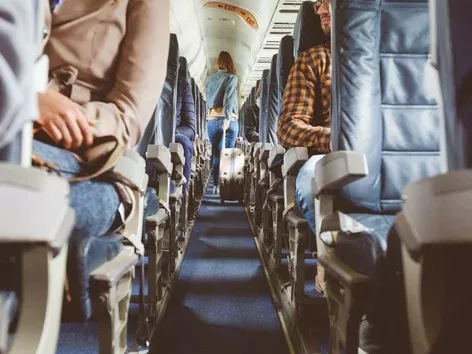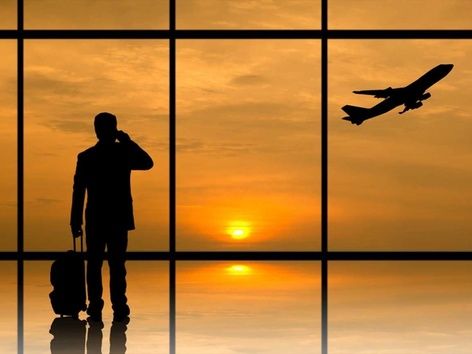How to manage a fear of flying: 11 useful advice from experts
Table of contents

Do you feel your heart pounding and your palms sweating when you board an airplane? There's nothing to be afraid of! In fact, it is estimated that up to 25% of people experience some level of anxiety when it comes to flying. Learn more about 11 useful tips from experts to help you cope with your fear of flying
Everyone knows that the probability of dying in a car accident is much higher than the chance of getting into a plane crash. However, despite this, many people in different parts of the planet are disturbed and frightened by the thought of a possible trip by plane. The reasons are different - someone is worried about staying in a closed space for too long, others don't like heights, someone is afraid of being depressurized due to opening a door or a broken porthole. And although according to medical studies, the clinical diagnosis of aviaphobia - the fear of flying - occurs in only 2.5% of the population, anxiety before traveling by plane is more common.
How to overcome your fear of flying? We have collected 11 useful tips from experts that will surely help you.
Determine the exact cause of your fear
Most of the time, you are not really afraid of the flight itself, but of a certain consequence - so it is important to analyze your anxiety before trying to overcome it. The most common fears associated with flying are the fear of death, confined spaces (claustrophobia), contracting COVID or other diseases, or even possible condemnation from fellow passengers. Once you figure out what makes you anxious about flying, you can focus on overcoming that particular trigger.
Demystify turbulence
Turbulence is wind currents that cause airplanes to wobble a bit. Their action can be compared to driving on a potholed road or sailing on a stormy sea. However, it is worth remembering that airplanes are specially designed to cope with turbulence and minimize it. Also, modern technologies are actively used to predict areas of turbulence so that pilots can avoid them and ensure the smoothest journey possible.
Learn more about aircraft construction
Prepare yourself and learn more about the design of the aircraft, its safety system and how it can withstand emergency situations.
It's also helpful to do some research on air circulation in airplanes to reduce your fear of contracting COVID-19 or any other illness while flying. Fresh air constantly enters the plane - in the cabin it is renewed every three minutes, before it passes through filters that remove 99.9% of impurities, including bacteria and viruses. In addition, the air in the cabin usually flows from the ceiling to the floor, not front to back, so viruses and bacteria usually do not circulate.
Study the history of plane crashes
It may seem strange, but in fact the method is effective. Armed with knowledge of past aviation incidents, you can feel more at ease when flying. Watch movies that tell the audience about plane crashes, because they usually tell you what went wrong, why it went wrong, and how the industry changed to prevent similar incidents from happening again.
You can also watch videos of all the tests that planes must go through before they can be cleared to fly, from stress tests that show how much the wings can bend to extreme flight tests that push the plane's limits.
Rely on the flight attendants
Flight attendants monitor your health during the flight. They know how to deal with fainting, hyperventilation and a list of various health incidents that can happen on a plane. Stewards and flight attendants are also aviation safety experts: airlines require flight attendants to undergo in-person training once a year – and this is supplemented by regular online training.
The rules of entry and stay in any country in the world are collected on the Visit World portal. USA, Great Britain, China or Australia – a list of travel documents and basic requirements in one place.
Take a lesson in flying an airplane
Often people aren't actually afraid of flying, they're afraid of what they don't know. A flight lesson will help overcome the unknown - if not on a real plane, then at least on a simulator. This way, when you board your next flight as a passenger, you'll have a complete understanding of how the plane works.
Choose the right place
Depending on what exactly scares you, choosing the right place will help avoid the trigger: if you are afraid of heights, stay away from windows. But if you need to always know what's going on, sit by the porthole. Aisle seats may be suitable for those who suffer from claustrophobia.
Look for something to distract you
Some people, while watching a good movie or listening to a podcast, can forget that they are on a plane altogether. Therefore, try to find an interesting activity that will divert your attention from anxiety.
Travel with a reliable companion
It is better to go to meet your fear together with a reliable companion. Be honest, talk about your feelings, and share anything you think will help you get rid of your phobia.
See a therapist
If your fear is truly paralyzing, you're probably better off seeking professional help. Together with a psychologist, you can overcome it with the help of therapy. In severe cases, doctors prescribe anti-anxiety medication.
Fly anyway
The surest way to fight a phobia is to experience what scares you. Come into contact with the stimulus that causes fear and challenge your exaggerated, irrational ideas about it. Avoidance, on the other hand, only exacerbates fears. So, if you really want to overcome your fear of flying, the best thing you can do for yourself is get on a plane. Start small with a very short flight, then gradually move to longer ones.
The plane is the fastest and most convenient way to travel, so we hope that our tips will help you overcome your fear and very soon you will be able to go on a fantastic trip and discover this interesting world for yourself.
The editors of Visit World recommend using the Guide for any country in the world for a comfortable and safe trip.
The guide is a detailed written document that contains basic advice on obtaining a visa, crossing the border, getting a job, citizenship, and much more. More details at the link.
Products from Visit World for a comfortable trip:
Travel guide for 200 countries;
Legal advice from a local specialist on visa and migration issues;
Travel insurance around the world (please select the country of interest and citizenship to receive services);
Medical insurance all over the world.
Photo: Getty Images
Recommended articles
3 min
Work
The best entry-level jobs for expats: working abroad without experience
If you're looking for a job abroad with no experience, there are a variety of options to consider. However, it is important to keep in mind that each country may have its own requirements and restrictions for foreign workers. Learn more about the best and most popular entry-level jobs for expats
16 Dec. 2023
More details2 min
Expats
Increasing the quota for the number of foreign workers in Estonia to address the labour shortage
The Estonian Employers' Confederation is asking for an increase in the country's immigration quota due to a labour shortage. The biggest shortages are in the IT, transport, construction and education sectors. Learn more about the possibility of increasing the foreign labour quota in Estonia
14 Feb. 2024
More details2 min
Travels
How to stay healthy while traveling in India
India is a country that offers travelers a great deal of diversity. Unfortunately, because India is a developing country, many travelers fall victim to the infamous "Delhi Belly" or other digestive system diseases due to poor sanitation. Learn tips on how to protect yourself while traveling in India and stay healthy
13 Feb. 2024
More details2 min
Events
On Valentine's Day, stores around the world are filled with red balloons and talk of love. However, Valentine's Day is celebrated differently in different countries around the world. Learn more about the history of the holiday of all lovers, how different countries celebrate Valentine's Day and the most interesting traditions
14 Feb. 2025
More detailsAll materials and articles are owned by VisitWorld.Today and are protected by international intellectual property regulations. When using materials, approval from VisitWorld.Today is required.
